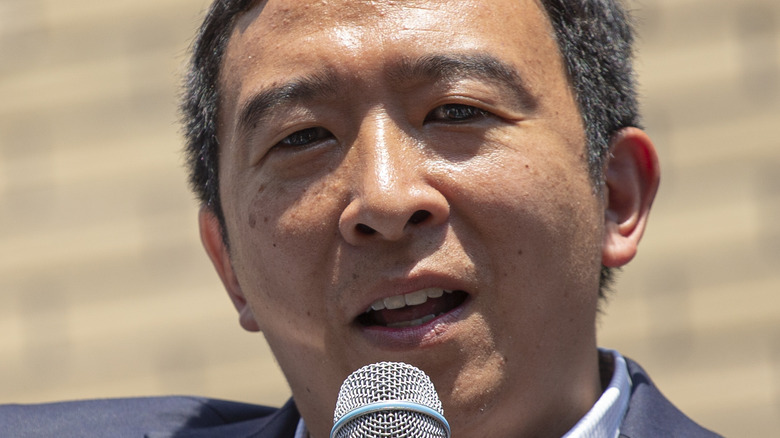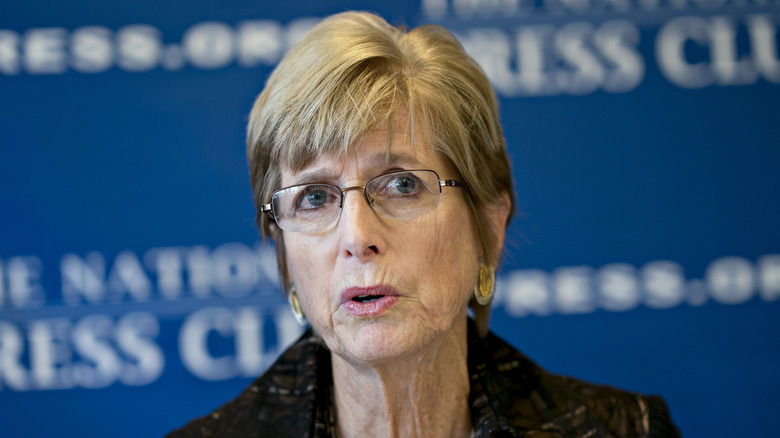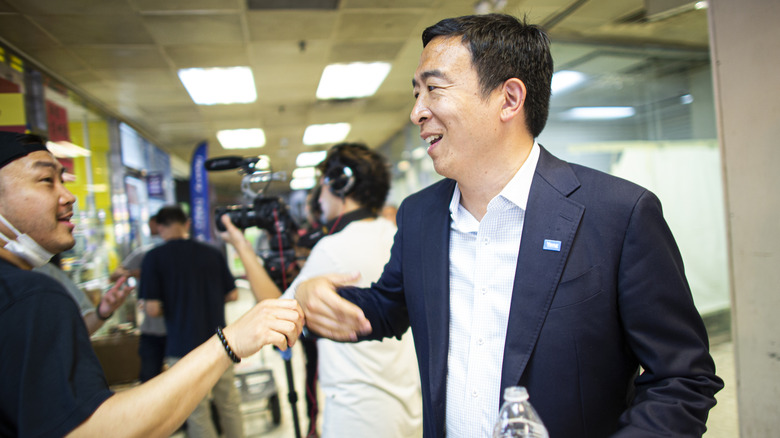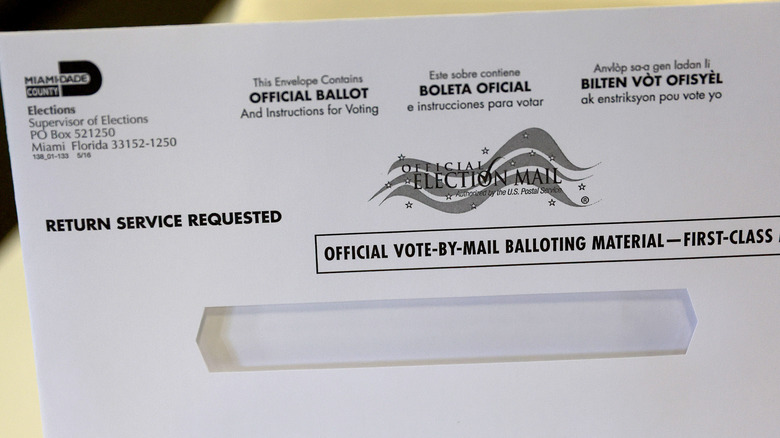What Is The Forward Party?
In the past few years, American politics have been at some of their rockiest points. It seems that now more than ever, Americans dissatisfied with the state of the nation. As the Pew Research Center reports, only a paltry 20% of Americans have faith and trust in their government, signaling a time for change. And one contentious aspect of American government happens to be the two-party system.
As U.S. History explains, the modern two-party system of America has its roots in the election of 1796, when the Democratic-Republicans and Federalists waged electoral war against each other, solidifying a political binary that would transform the nation. In modern times, many third party and independent candidates attempt to disrupt this binary, such as Forward, a third party created by Andrew Yang (above) and Christine Todd Whitman. Forward was officially formed on July 27, and identifies itself as a centrist-minded party made up of former Democratic and Republican politicians (via Reuters). This new party attempts to offer an alternative to the two-party system by working with people across the political spectrum. But what are their driving goals? And why did they form in the first place?
Forward was born out of political frustrations
Forward's mission statement is simple: cooperation. As said on their official website, Forward's aims are to bridge people of all political backgrounds together to fix the problems of America and transform the political landscape: "While other political parties look to divide America into different camps, the Forward Party aims to bring them together." Andrew Yan is a former Democratic presidential candidate, and Christine Todd Whitman (above) is a former Republican governor of New Jersey.
As Ballotpedia says, Yang's campaign was characterized by his signature policy, Universal Basic Income, which promised $1,000 a month to every American. He unsuccessfully ran for mayor of New York in the 2021 primaries, then co-founded Forward, in 2022. Whitman was New Jersey's first woman governor. As explained by Rutgers, she was elected on November 3, 1993, and stepped down on January 31, 2001, to accept a position with President George W. Bush as an Environmental Protection Agency administrator.
Both Yang and Whitman were disappointed with what they saw as an unfair system that only services two parties. Their goals are to bring more diversity to politics (via Reuters).
The Forward party aims to reduce partisanship by being an open party
Partisanship basically means a strong preference or bias in politics. It can best be thought of as uncompromising party loyalty, as Britannica explains. On the opposite side, bipartisanship is when political parties cooperate and compromise to achieve a common goal. Partisanship is seen as one of the most contentious and hotly discussed topic in politics today. As the Pew Research Center says, partisanship is the single most important dividing line in American politics.
As explained on Forward's official website, their goal is to remove partisanship from government. Their ideal is cooperation between differing perspectives, reaching a middle-of-the-road solution. The party's official slogan is "not left. Not right. Forward." As their website's FAQ says, the party attempts to distinguish itself from other parties by being one that accepts all people from across the political spectrum. This means that the party has Democrats, Republicans, and independents, which distinguishes it from traditional party makeup.
Forward is made up of familiar political names, both Republican and Democrat
Given that Forward's aim is to enlist the help of people from different backgrounds, it makes sense that the party's makeup would be diverse. There's the fact that Forward was founded by two people from opposing parties, Yang and Whitman, but also the various parties that have merged together to make it. As said on their website, they hope to attract from all sides.
The Guardian explains that Forward is actually a coalition of three political groups merged together: Renew America Movement, Serve America Movement, and Forward. The Renew America Movement is a political party consisting of officials from various presidential administrations, including those of Donald Trump, Ronald Reagan, George W. Bush, and George H.W. Bush. Forward is the party founded by Andrew Yang. The Serve America movement was started by Republican David Jolly, and is a mixture of Independents, Democrats, and Republicans.
Forward wants funding from everyday people, not special interest groups
Money in politics is an often-talked-about issue in America. There is a growing fear among the public that politicians are being overly influenced — essentially, bought — by lobbying and deep pockets. As Robert Reich, former Secretary of Labor in the Clinton administration, wrote for Salon in 2020, money is corrupting politics. One of Forward's driving claims is that it will not be loyal to interest groups, but instead build its finances through donors from all kinds of backgrounds. As their FAQ states, Forward aims to stay funded from people not associated with big interest corporations. One thing that Forward also depends on is volunteer help from everyday people.
Forward's initial budget is $5 million, which it acquired from various donors between the three groups making up its coalition (via The Guardian). Whether that money is also coming from the same corrupt corporate influence Forward wishes to fight remains to be seen. For now, the party's goals seem to be expanding infrastructure. The group will roll out its expansion plan in September, starting with a banquet of events, followed by a convention in 2023.
Forward wants to succeed where other third parties have failed
Forward is facing a monumental hurdle: becoming a successful third-party. In the current American climate, this is actually a fairly difficult thing to accomplish. As CNN reported in 2012, third parties in America have a long history of failing, even when the general public expresses great dissatisfaction with the two-party system. Americans Elect, a third party that tried to establish itself in the 2012 election, failed to get any significant traction, despite spending $35 million on a campaign. Ross Perot, an independent candidate, ran in the 1992 election as third party, but also failed to take off. Many more third parties failed to succeed where big parties often do.
Miles Taylor, a former Trump administration Homeland Security official, says that Forward has a better chance than many other third parties (via The Guardian). Taylor argues that support for a third party is at an all-time high, giving Forward a huge leg up in wading through new waters. Statistically, this seems to be true, as 62% of Americans currently show support for a third party (via Gallup). The single biggest issue third parties have is the sheer number of resources and political backing available to the Democratic and Republican parties. As Open Secrets notes, both Democrats and Republicans rack up hundreds of millions of dollars in donations during elections, which is difficult for smaller, unknown parties to do. Only time will tell where Forward will go and whether it will actually take off — and move forward.





